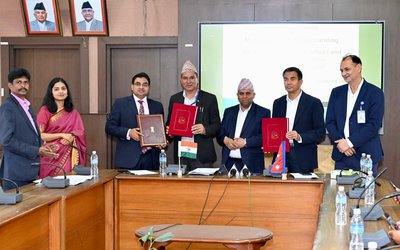Writing on faith without referring to St. Augustine, St. Francis and St. Paul would be a mistake, but the objective of this chapter is limited to highlighting the basic features of faith. Both belief and faith have their origin in our psyche. Belief is an inbuilt element of human psychology. It is believing that something higher and nobler than us exists, although it is not yet known completely. So believing is not yet knowing. It is an uncritical approach to what is. It represents a religious instinct in man, and forms the most important base of all religions. Belief is initially a mental acceptance that there is something that is believable. Belief does not yet possess the certainty of experience, but there is an implied assurance in what you believe. Belief entails recognition of some facet of truth that springs from within; but it is not the result of philosophical reasoning. Belief could be traditional or cultural; may be enforced upon us by the society or cultural environment. It is neither theoretical nor empirical; it is a human faculty that has some physic connection with reality which is yet to be verified. Belief is not concerned with whether it is verifiable; it just constitutes an aspect of our psychological structure. It is a kind of uncertain waiting in the hope of obtaining the object of belief. In fact, we do not have any intellectual means to prove its validity, except through an a-priori recognition of “something”. Belief usually tends to move along the set grooves which often leads to serious conflict between the new knowledge and old traditional systems of religion, culture etc. which leave little room for readjustments.
Belief may proceed from an assurance that there is something that is believable, but it could be misleading if it is based on superstition. Our mind has many levels of understanding. Correct understanding enhanced by reflections and contemplations helps us to properly use the power of belief and faith or even to correct erroneous beliefs and faiths. A discursive and rationalistic mind comes to our aid as superstition can be dispelled by rationalistic analysis of what constitutes the background of our superstition. One is then no longer led by mass belief, and starts to take recourse to personal belief, which hesitates to proceed further without some preconceived justification. Such a belief prepares the ground for personal faith which too needs to be re-evaluated as we grow in our understanding of reflective and contemplative capabilities.
While belief connotes an intellectual assent that has not yet won our full trust, faith implies a deep trust on the object of faith. While faith accepts the existence of reality without any question, and so can be considered passive or even blind, belief is not blind. When you say to your child called belief: jump I will catch you, he is likely to hesitate, but your another child called faith will jump without any hesitation. So there always is a gap between belief and faith. Most of us believe in God, but we do not realize God because we know Him through defined concept. This, however, does not stop us from believing in God, but we cannot proceed ahead unless we heal up this gap between belief and faith through lived experience. In the process, we come across different levels of belief which reveal finer aspects of the power of belief. But we also come across moments when we have special types of visions or revelations which give rise to stronger beliefs. Here faith comes to our aid as it opens the venues of communication with what is beyond belief. Belief turns into faith when lived experience proves what is implied by belief. While belief indicates at psychological truth of things, faith goes a step further. It can acquire a taste of truth which is implied in belief but which belief cannot taste. Belief is thus prior to faith. Faith usually starts with belief, but what usually happens with us is that we take for granted what belief entails without establishing a firm ground to support it. Initially, faith too has to overcome many of the uncertainties that belief has to cross, and it too does not start from direct experience of complete faith although it cannot possibly function without an intuitional assurance of the object of faith.
Faith is prior to experience: it continues to pursue after the object of faith in spite of initial disappointments because there is something in the faith that foretells the reality. The power of faith then rests in the truth in faith- Radhakrishnan. Faith is soul’s inner call; it stands for something that has not yet manifested. It gives the go-ahead signal, and we often follow it. All religions have some revelatory aspects, but they reveal to us not necessarily through critical reason, but more through an appeal to faith, through a feeling realization of faith. So faith is there before experience; it has to be uncovered and cultivated. Belief, faith and revelations are thus interlinked and reinforce each other. Each of them undergoes evolution. For example, the meaning of belief has undergone a complete metamorphosis in the West. Belief was once belief in what our ancestors believed; but then belief would usually mean credulous acceptance of creedal doctrines. For example, the meaning of belief implied by ancient Greek philosophers may seem credulous to us as pointed out by K. Armstrong. Jung talks about religious people as believers “who remain children instead of becoming as children”. One may also recall Christ’s well known saying, “Except ye become as little children ye shall not enter the kingdom of heaven”. In other words, the believer has to swallow up the Christ’s saying by an act of faith. He must behave like a child in front of God, and must accept the divine play with a purity of heart and mind i.e. with complete faith. According to Eastern thinking this purity can be had by “tranquilizing the senses, cleaning the mind and simplifying the heart, -Radhakrishnan.
The interdependence between belief and faith grows stronger as they reinforce each other by providing a psychological support to one another, but faith has a stronger hold on our mind than belief has. Initially, faith accepts a certain degree of risk i.e. it believes in something which still is doubtful, but is willing to go beyond the literal evidence. In its true sense, faith connotes complete faith which remains unshaken even by contrary evidence. It is now acknowledged that whichever path we choose for spiritual journey, we also accept that it is difficult to embark on a spiritual journey without a certain degree of faith. Faith is then a working hypothesis which proves itself as we proceed ahead. Faith is subconsciously rooted in our inner Being. “It is there within us. It has to be uncovered and brought out. Belief in God and faith in God are different. A belief is valueless if you don’t test it and live by it. Belief converted into experience becomes faith. Faith cannot be contradicted; it is intuitive conviction of truth, and cannot be shaken even by contrary evidence” says Sri Sri Paramahansa Yoganada. Faith has its roots in God, and goes beyond what is material, rational and scriptural. Of these, going beyond scriptures has been the most difficult hurdle in the history of religion. In the East, faith and reason are considered to be two different but interrelated things. Faith recognizes the limitations of reason that may hinder the flowering of faith, but the power of faith or of complete faith is such that it can overcome those limitations without necessarily suppressing them. In the West where God is sometime considered unknowable and unthinkable, where God is beyond reason and reason has no power to know God, faith alone is considered the way to God. But complete reliance on faith alone without lived experience puts science and religion on opposite sides. Although faith has to be complete faith, it is considered as a transition zone between belief and reality.
Both belief and faith are cumulative and complement each other. Each of them then becomes richer and fuller, self-sustaining and self-elevating making us grow in knowledge. Initially, both of them are based on a kind of feeling realization, but as they proceed on they also gather evidences to support those feelings. Besides, all the attributes of belief such as the initial assent, assurance, confidence, conviction etc, usually work synergically. While the West relies more on faith, the East accepts that Will too constitutes an important ingredient both of belief and faith. Belief and faith provide an appropriate background for action which must also be supported by Will or a combination of the cognitive soul and the executive power which is necessary for our spiritual development. It is an inner discipline; it is gathering conviction, and it is this conviction that propels us to act. We cannot believe if we do not have the will to believe, but it is also true that we cannot believe if we don’t have the Will.
Faith reveals itself when we have an inner experience of what we believe is true. Faith testifies that belief does have some verifiable ground. Faith then acts as power of channel between us and something higher, although faith always plays a supportive role. Belief then transforms itself into faith, which then reinforces itself more and more with accumulative effect in terms of force and efficacy i.e. faith becomes a means of progressive discovery and confirmation of truth until it becomes total, and provides its own verification. However, it is not the faith that provides the final conclusion, but lived experience which leads to spiritual enfoldment.
The journey ahead may now be considered well set philosophically, but not yet free of dangers, because more is determined by our personal efforts and less by the channel itself. Further, this journey is very much determined by the path we choose. A devotee may, at this juncture, transfer all his obligations to the Divine as did Ramakrishna Paramahansa. Faith then becomes complete faith or blind faith as termed by Ramakrishna Paramahansa. Viewed from this angle, blind faith can only be complete or no faith at all. Initially, both belief and faith are a-priori as their validity is verified only by our subsequent experiences. When one embarks on a religious journey, initially it is not on the strength of experience but on the strength of faith, which keeps us encouraging to move on in spite of initial failures until it becomes complete. One common feature both of belief and faith is that they are evolutive in their nature. Belief transforms itself into faith and that into complete faith, because of their cumulative and evolutive verification of our a-priori assumptions regarding them. When faith is complete it is knowledge and no longer faith. Although both belief and faith start without providing any permanent ground for their verification, they have something that is permanent as acknowledged also by some prominent Buddhists
Principally speaking, knowledge does not need the support either of belief or of faith. It is a direct encounter with truth through the act of living into life every day through thoughts, words and action. The accruing knowledge is knowledge by identity that uses neither intellect reasoning nor any mental construction. Although all the instruments/aids of knowledge such as sensory perceptions, emotions, feelings, intuition and rational thinking are important, the final transformation is through self-illumination, which occurs by transcending all these aids. The final knowledge is attained by identity; symbolically it is equivalent to 2 º 2. Knowledge is then called Absolute Knowledge which according to Eastern thinking is the ultimate knowledge but represents the most difficult path.
Faith constitutes the most prominent element of all religions. We have been putting more faith on faith than on divine intelligence or pure knowledge. However, with the advent of new scientific discoveries, particularly in field of quantum physics when science seems to almost border with spirit, the interrelationship between faith and knowledge has undergone some change or we can even say a metamorphosis. As some scientists or better scientific sages have indicated, it now seems possible to know the divine intelligence directly. Some scientists even interpret the ultimate existence as pure light, which is what the chapter 15 of Gita also says. Knowledge is then the widest power of consciousness. We are, therefore, prone to give the highest importance to the path of knowledge, sometimes to the extent that we may sideline and/or underestimate other paths. Yet love directly connects us with the deepest, most intense and most profound secrets of truth and that may be more appealing to most of us. In fact, when the two paths are integrated there occurs a fusion of thoughts and feelings, of reason and love with the result that both of them are transcended and a more effective power of channel is created between us and the truth.
The final judge in all cases is, however, direct experience. Now if all hangs on direct experience which seems to be so difficult, and if the success depends more on personal efforts then what is there that might give us enough strength, courage and persistence to go for that experience? Most of us have that inbuilt capacity or at least an inbuilt instinct for truth. It may be currently dormant in us, but we will, at one or another time, be drawn towards the truth provided we become convinced about the truth and start reflecting and contemplating on it. We become aware of the truth only when we have some encounters with the truth itself. The road ahead of such encounters is best lit by meditation (particularly Buddhistic meditation) and consistent effort we make to achieve or realize the truth. Excepting a few dedicated mediators, such encounters are likely to be occasional, sporadic and, at best, only mental, but mental experiences alone are not enough to convince the physical base. At some stage of meditation one can and should bring down the experience to the level of our physical base as only then can one hope to consciously profit from meditation. Our base is not that very opaque to such experiences and moments do come when we do profit from meditation, but the problem is recognizing it from a non-physical plane and not emotionally.

Prof. Dr. Akal Bahadur Singh
Prof. Dr. Singh was one of the founding Pragya in the old pre-1990 RONAST. Recently he has been spending much of his time thinking about the relationship between science and spirituality.
- Sensations, Perceptions And Concentrations
- May 02, 2024
- Insights And Inspirations
- Oct 01, 2023
- Reason, Understanding And Knowledge
- Jul 25, 2023
- Ideas, Actions And Experiences
- Sep 07, 2022
- Unity In Diversity
- Aug 16, 2022














